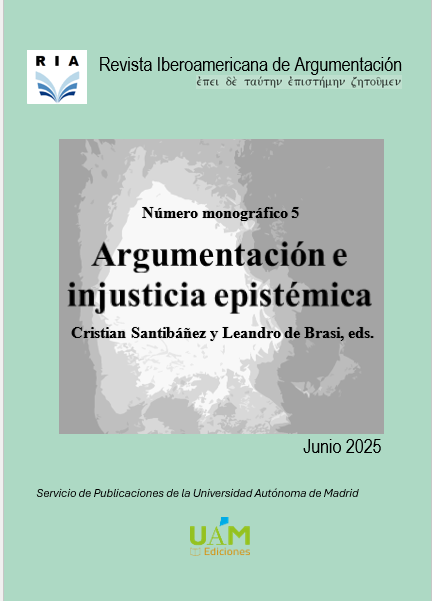Keywords:
epistemic agency, witnesses, consequentialism, responsibilismCopyright (c) 2025 Florencia Rimoldi, Rodrigo Coloma

This work is licensed under a Creative Commons Attribution-NonCommercial-NoDerivatives 4.0 International License.
Abstract
In this article we evaluate the dispossession of epistemic agency that witnesses often suffer. We argue that this is not only problematic from a general epistemic point of view, but also for the fulfillment of the epistemic purposes of judicial processes. We examine ordinary civil procedure in Chile, where interaction with witnesses is marked by distrust of them. We present a paradigmatic case of the normal dynamics, and we show that it is epistemically unsatisfactory. Then, we make the consequentialist-veritist epistemological model that supports what we call “the myth of the incompatibility between efficiency and recognition.” explicit. It seems to support the aforementioned dynamic by implying that favoring alternative practices that allow for greater recognition of different agents would result in a loss of effectiveness of the processes. This model is far from being obvious or intuitive, and is rather based on substantive theoretical commitments. We show that under an alternative responsibilist model, the recognition of witnesses contributes centrally to the epistemic quality of judicial processes, thus blocking the argument that leads to the myth of incompatibility.
Downloads
References
Allen, Ronald, J. “The Conceptual Challenge of Expert Evidence”. Discusiones filosóficas, 14 (23), 2013: 41-65.
Amaya, Amalia; Ho, Hock Lai, eds. Law, Virtue and Justice. Hart Publishing, 2013.
Baher, Jason., The Inquiring Mind. On Intellectual Virtues & Virtue Epistemology. Oxford University Press, 2011.
BonJour, Laurence. “Externalist Theories of Empirical Knowledge,” Midwest Studies in Philosophy, 5 (1980): 53–73.
Canale, Damiano, y Tuzet, Giovanni. La justificación de la decisión judicial. Lima: Palestra, 2021.
Cassam, Quassim. “Vice Epistemology”, Monist, 88 (2016): 159–80.
Cercas, Javier. El impostor. 1ª ed. (en Chile). Santiago: Penguin Random House, 2015.
Chiassoni, Pierluigi. Técnicas de interpretación jurídica. Madrid: Marcial Pons, 2011.
Coloma, Rodrigo; Larroucau, Jorge; Páez, Andrés. “Sobre el impacto judicial de la concepción racionalista de la prueba”, Revus [Online], 53 | 2024. URL: https://journals.openedition.org/revus/10230.
Coloma, Rodrigo; Rimoldi, Florencia. “¿Es útil el concepto de injusticia epistémica para los procedimientos penales?”, Revista Brasileira de Direito Processual Penal, v. 9, n. 1, 2023: 261-307.
Craig, Edward. Knowledge and the State of Nature. Presses Universitaires de France (1990)
Damaška, Mirjan. Las caras de la justicia y el poder del Estado. Análisis comparado del proceso legal. Santiago: Editorial Jurídica de Chile, 2000.
Duarte d´Almeida, Luis “¿Qué es aplicar derecho?”. Discusiones 27, 2021, pp. 25-57.
Enoch, David; Fisher, Talia y Spectre, Levi. “Does legal epistemology rest on a mistake? On fetishism, two?tier system design, and conscientious fact?finding”, Philosophical Issues 31 (1), 2021: 85-103.
Fricker, Miranda. “Conceptos de injusticia epistémica en evolución”, en De Brasi, Leandro y Santibáñez, Cristián (eds.). Injusticias epistémicas: Análisis y contextos. Lima: Palestra (2022), pp. 17-34.
García, María Cecilia; Agüero, Claudio. “Bases para el estudio de la dinámica discursiva en la comunidad jurídica chilena”. Revista De Derecho (Valdivia), 27(1), 2014: 59–79.
Goldman, Alvin. “Reliabilism, Veritism, and Epistemic Consequentialism”. Episteme, 12 (2), 2015:131-143.
González, María de los Ángeles. “Repensando el testimonio: la distinción entre agente y producto”. Revista Chilena de Derecho, vol. 46 Nº 3, 2019: 791 - 819.
Gorin, Moti. “Do Manipulators Always threaten Rationality”. American Philosophical Quarterly, 51, 2014: 51–61.
Grice, H. Paul. “Lógica y conversación” en Valdés, Luis (comp.) La búsqueda del significado. 4ª ed. (reimp.) Madrid: Tecnos, (2019) pp. 520-538.
Haack, Susan. “Irreconcilable Differences? The Troubled Marriage of Science and Law”. Law and Contemporary Problems, 72, 2009, 1-24.
Hookway, Christopher. “How to be a Virtue Epistemologist,” en DePaul, Michael y Zagzebski, Linda (eds.), Intellectual Virtue: Perspectives from Ethics and Epistemology, Oxford: Oxford University Press, (2003) pp.183–202.
Kahneman, Daniel. Pensar rápido, pensar despacio. Buenos Aires: Debate (2012).
Kukla Quill. “Situated Knowledge, Purity and Moral Panic.” en Lackey, Jennifer (ed.), Applied Epistemology, Oxford: Oxford University Press, (2021) pp. 37–68.
Lackey J. Learning form Words. Testimony as a Source of Knowledge. Oxford: Oxford University Press (2008).
Lackey, Jennifer. Criminal Testimonial Injustice, Oxford: Oxford University Press (2023).
Larroucau, Jorge. “Razonamiento hermenéutico y ‘hechos sustanciales controvertidos’”. Revista Chilena de Derecho, vol. 44, Nº 1, 2017: 159-183.
Laudan, Larry. Truth, Error, and Criminal Law: An Essay in Legal Epistemology. Cambridge: Cambridge University Press (2006).
Leiter Brian; Allen Ronald J. "Naturalized Epistemology and the Law of Evidence," Virginia Law Review 1491, 2001.
Luban, David; Wendel, Bradley. “La filosofía de la ética profesional: Una historia entrañable”. Revista de Derecho (Valdivia), 33(2), 2020: 49-78.
McHugh, Conor. “Epistemic Responsibility and Doxastic Agency.” Philosophical Issues 23, 2013: 132–57.
Moran R. “Getting Told and Being Believed.” En J. Lackey and E. Sosa (eds), The Epistemology of Testimony, pp. 272–306. Oxford: Oxford University Press. (2006).
Pritchard, Duncan. “Veritism and the Goal of Inquiry”, Philosophia 49 (4), 2021:1347-1359
Reed, Baron.“Who Knows?”, en Fernández, Miguel A. (ed.), Performance Epistemology: Foundations and Applications, Oxford, Oxford University Press, (2016) pp. 106-123.
Rimoldi, Florencia; Rovatti, Pablo. “Extraer la verdad del testigo adversario: ¿es el contraexamen un mecanismo epistémicamente justo?” En Rovatti, P. (ed.). La defensa penal: cuestiones fundamentales, CDMX: Centro de Estudios Constitucionales de la SCJN de México (2025).
Ross Angus. “Why Do We Believe What We are Told?” Ratio 28, (1986). 69–88.
Ross, Lewis.“The Foundations of Criminal Law Epistemology”, Ergo an Open Access Journal of Philosophy 9: 58, 2023 doi: https://doi.org/10.3998/ergo.3583
Wróblewski, Jerzy. “

